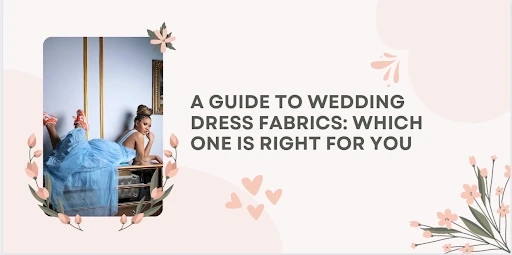When it comes to planning your wedding, one of the most important decisions you'll make is choosing the perfect wedding dress. However, to find the dress that's just right for you, you must consider various factors, including the silhouette, design, and embellishments. And one crucial but often overlooked aspect of your wedding dress is the fabric it's made of.
The fabric of your wedding dress plays a significant role in how the dress looks, feels, and drapes on your body. With so many options available, it can be overwhelming to choose the right fabric.
In this comprehensive guide, we will break down the most common fabrics for wedding dresses and gowns, their characteristics, and the factors you should consider when making your choice.
Why Wedding Dress Fabric Matters
Before we delve into the specifics of wedding dress fabrics, let's understand why the choice of fabric is so important.
Comfort: Comfort is crucial on your special day. The fabric should feel comfortable against your skin, especially if you'll be wearing the dress for an extended period.Season and Venue: The climate and location of your wedding should influence your fabric choice. Heavier fabrics may be perfect for winter weddings, while lightweight fabrics are ideal for beach or summer ceremonies.Body Shape: Different fabrics drape differently and can either emphasize or disguise certain features of your body. The fabric can help create the illusion of an hourglass figure or give a more modest silhouette.Budget: The type of fabric can also affect the cost of your wedding dress. Some fabrics are more expensive due to their rarity or intricacy, while others are more budget-friendly.Common Wedding Dress Fabrics
Let's explore some of the most popular wedding dress fabrics and their characteristics:
1. Silk
Silk is often considered the ultimate choice for wedding gowns and dresses. It is a natural, luxurious fiber known for its softness and sheen. Several variations of silk are used in wedding dressmaking, including silk charmeuse, silk chiffon, and silk satin.
It's breathable and comfortable, making it a good choice for various seasons and venues. However, it can be expensive, and delicacy may require careful handling.
2. Lace
Lace is a timeless and romantic fabric often used for wedding dresses. It comes in various types, including Chantilly, Alençon, and Guipure, each with its unique characteristics. Lace can be used as an overlay or incorporated into the gown's design. It adds a touch of vintage or bohemian charm to your dress.
Lace wedding dresses are versatile and suit a range of wedding styles, from rustic to elegant. However, lace can be fragile and may snag on jewelry or accessories, so handle it with care.
3. Tulle
Tulle is a lightweight, fine netting fabric often used to create whimsical and romantic looks. It is commonly used for ballgown skirts and veils. Tulle allows for layering and can add volume and depth to your dress.
Tulle dresses are perfect for brides who want a fairytale or princess-like appearance. They are also great for creating a bit of drama and flair without adding too much weight to your gown.
4. Satin
Satin is a popular choice for wedding dresses due to its smooth, shiny finish. It is a versatile fabric that drapes well and creates a sleek and elegant look. Satin is often used for A-line and ballgown silhouettes.
Satin wedding dresses are known for their timeless and classic appeal. They are ideal for brides looking for a traditional and formal style. However, satin can be heavy and may not be the best choice for hot-weather weddings.
5. Organza
Organza is a sheer, lightweight fabric that resembles a mix of silk and chiffon. It is often used as an overlay or for creating delicate details on bridal gowns. Organza can add a touch of whimsy and softness to your dress.
Organza dresses are perfect for brides who want a lightweight, airy gown. They are great for destination weddings or ceremonies with a relaxed, ethereal atmosphere.
6. Crepe
Crepe is a smooth, matte fabric known for its draping capabilities. It's often used for sheath-style wedding dresses that hug the body's contours. Crepe gowns have a modern and minimalist aesthetic.
Crepe wedding dresses are great for brides who prefer a sleek, contemporary look. They are also comfortable to wear and move in, making them ideal for dancing the night away.
Personalizing Your Wedding Dress
Once you've chosen the right fabric, you can further personalize your wedding dress by considering the following options:
1. Embellishments
Embellishments can add a touch of sparkle and individuality to your dress. You can opt for sequins, crystals, or beading to enhance the fabric's beauty and create a unique look.
2. Neckline and Sleeve Styles
The neckline and sleeve styles can dramatically change the overall appearance of your dress. Consider options like strapless, off-the-shoulder, sweetheart, halter, or long sleeves to match your personal style.
3. Back Details
The back of your dress is an often-overlooked canvas for personalization. You can choose to make a statement from open-back, keyhole, illusion, or low-back designs.
4. Train Length
The length of your train can add a sense of grandeur to your dress. Options range from a simple sweep train to a dramatic cathedral train.
5. Veil and Accessories
Your choice of veil and accessories, such as a tiara, headpiece, or jewelry, can complete your wedding day look and tie everything together.
Conclusion
Now that you know the ins and outs of wedding dress fabrics, you can confidently choose the perfect one to make your designer wedding dress for 2024 a dream come true. Your wedding gown will reflect your style and provide the comfort and elegance you deserve on your special day.


